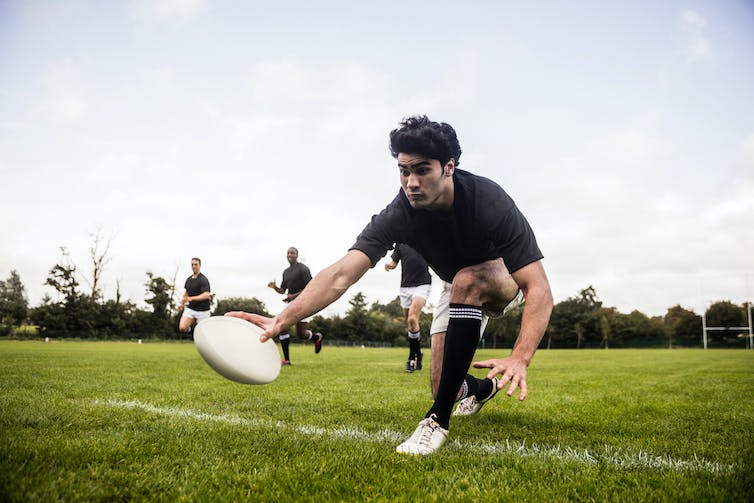Student sport has a drinking problem – here’s what needs to be done to change it

Sport is generally considered a health-enhancing lifestyle choice. It reduces depression, anxiety and emotional distress and improves self esteem.
Despite this, there is strong evidence that many athletes – particularly those at university – engage in harmful levels of alcohol use. Multiple studies conducted across different UK universities over the past decade indicate that sport participation may be a risk factor for the development of alcohol use disorders.
Our new research used qualitative interviews to understand what was driving athletes to consume alcohol. Over the course of a season, we recruited male and female rugby union athletes to take part in semi-structured interviews.
During these in depth interviews, athletes discussed the reasons they consumed alcohol, how they felt this differed, or was similar, to their teammates and other students, if the reasons they drink had changed over time, if they felt their drinking was linked to their sport and what role alcohol played in their sport.
Past research from Northumbria University showed that 85% of students who played team sports were classified as having an alcohol use disorder, with rugby, football and hockey players reporting the highest levels of drinking.
What’s causing student athletes to drink heavily?
Our study suggests this sport drinking culture is being driven by a social hierarchy and status-seeking behaviours. We found that experienced athletes feel that novices need to go through the same (often degrading) experiences they had.
Experienced players had control over other less experienced teammates and those lower in the social hierarchy were forced to binge drink because they were new to the culture.
Athletes explained that initiation ceremonies, nights out and away games were all opportunities for older players to display dominance over novices, with initiation ceremonies key to maintaining the social hierarchy.
Nights out were one of the main sites for binge drinking.
Shutterstock / Pra Chid
Despite speaking negatively about the social hierarchy, those in subordinate positions saw positives in the process. They rationalised these practices as useful for helping them feel more comfortable around teammates, given they had a mutual experience of being humiliated.
You don’t have to drink to play rugby but if you don’t want to drink you’ve got to really be ballsy. I’d be scared to say, “No, I’m not drinking,” to about 30 different third years shouting around you. It’s just what we’re told to do and you kind of have to follow otherwise it’s not going to put you in great stead for the rest of the year. – Harry
The social hierarchy was underpinned by the status of certain players. This enabled them to coerce other – often more novice – teammates. There were social rewards to be gained from binge drinking and engaging in “notorious” or “stupid” behaviours (such as drinking “a whole bottle of wine through a fresh salmon head”).
Drinking to navigate social hierarchies
On one hand, alcohol use functioned to maintain social divisions and convey dominance. On the other, drinking provided the opportunity for players to negotiate their position and climb to a higher standing. Participating in drinking practices was key to each person’s position within the group.

Alongside football and hockey, rugby players reported the highest levels of drinking.
Shutterstock / wavebreakmedia
There was also a fear among players, particular younger athletes, that refusing to engage would leave them at the bottom of the heap. Players described a culture of fear where they were “scared to say no I’m not drinking”.
Novice athletes appeared to be engaging in the culture of intoxication for social survival, rather than personal choice. Athletes – and younger athletes in particular – feared opposing the pressure to consume alcohol.
Essentially the people want a story to tell. They wanted to say, “We did this, and it was wild,” everyone wants that story. The people who set the initiation think, “Well, we had to do it, you aren’t getting off.” – James
Complying with drinking rituals and traditions was perceived to be a show of strength. Those who demonstrated the most extreme behaviours were rewarded with elevated status and respect. There was also a need to ensure that everybody complied and nobody got off lightly.
Senior players who had already been on the receiving end of the humiliation developed a sense of injustice if others did not go through the same experience. Athletes used the fact that the power imbalance will soon shift in their favour to justify being on the receiving end of these rituals.
Because we got given it, we had it done to us, so now they’ve got to be given it. They’ll be able to give it to someone next year. It’s like power over people. You wouldn’t have power over them in any other situation. – Rhys
Novice athletes explained that the vision of them putting the pressure on others was enough to appease anxieties around currently bearing the brunt of the intimidation.
What needs to be done to foster a healthier environment?
Our research implies that to address the heavy drinking culture in university sports, new people with a more measured approach to alcohol need to be grown into positions of strength within the social hierarchy. This will involve giving players with more moderate drinking habits leadership opportunities within university teams.
Findings of the research have suggested that universities need to advocate for a more moderate drinking culture and educate players on the harms of excessive drinking and its negative physiological and psychological impact on performance.
Alternative social activities also need to be introduced which fulfil the need to build team cohesion. This will help to change the values, norms and expectations within university sport and develop a culture with less reliance upon alcohol use and intoxication.






